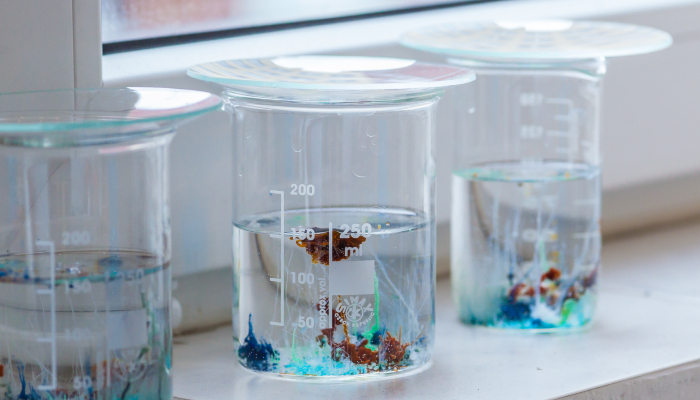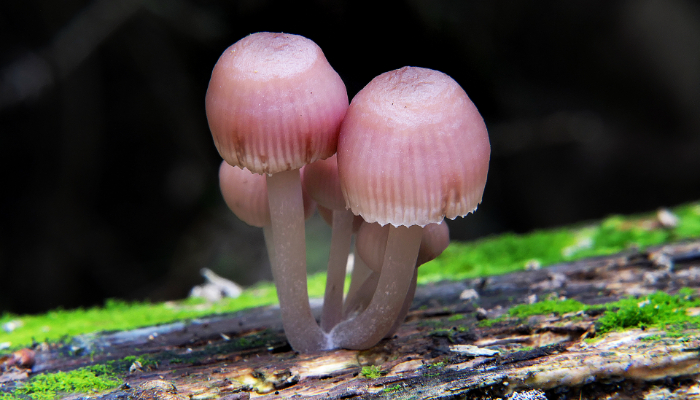Chemistry
Where can I find information about chemistry and chemical elements?
(Years 11-13)

Image: Chemical garden - UFCH JH (2020) by Tadeáš Bednarz on Wikimedia Commons.
Entry last updated: 10/07/25
Introduction
Everything is made of chemicals. There are natural chemicals, like those made by plants and animals, and there are also synthetic chemicals, those that people have made or manufactured. The study of chemical elements and compounds is called chemistry.
Atoms and compounds
There are many good websites that have useful facts, images, and other information about chemistry, chemicals and compounds. Here are some of our favourite sites that have information about atoms and compounds.
A good place to look for scientific information is EPIC. EPIC is a collection of reliable databases covering lots of different topics, and it's put together especially for New Zealand school students. You may need a password from your school or local library to access it.
This particular resource has lots of articles from encyclopedias, magazines and journals.
Login using your school password (or ask a librarian on AnyQuestions).
Search using keywords such as 'atoms' or 'compounds'.
Or go to Browse Topics and from the drop down menu choose Chemistry.
Browse through the list for topics like Atoms and Atomic Theory or Chemical Compounds.
These pages will have an overview of the topic and then more information in types eg reference or videos.
Tips: To get to the EPIC resources you will need a password from your school librarian first. Or you can chat with one of our AnyQuestions librarians and they will help you online. Some EPIC databases may also be available through your public library.
A reliable source of information is Britannica School, an online version of the Encyclopaedia Britannica.
Login using your school password (or ask a librarian on AnyQuestions).
Search using keywords such as 'atoms' and 'chemistry'.
The Chemistry article has information about the scope, methodology and history of chemistry.
Tips: Search words, or keywords, are the most important words in our question. Usually it’s better to leave out small words like ‘the’, ‘a’ and ‘of’ and just choose the main ones, e.g. 'chemistry' We can always change our keywords or add more if we need to.
The Periodic Table
The periodic table is a grouping of the natural chemical elements, and man-made or synthetic elements, arranged by atomic number so that elements with similar chemical properties and atomic structure line up in the same columns.
HowStuffWorks is a really good website for finding out how all sorts of things work. Often the articles we find will go over multiple pages, so we need to click through them to find more info. We can learn more about who runs the website by reading the About page.
Search using keywords like 'periodic table'.
Select an article such as How the Periodic Table Works.
Use the tab Next page to get more information.
Tips: Some websites have advertisements (or ads) which ask us to buy something or tell us to ‘click here’. It’s best to ignore these ads and focus on the information we’re looking for.
Infoplease is a reference and learning site, combining the contents of an encyclopedia, a dictionary, an atlas and several almanacs loaded with statistics, facts, and historical records.
From the Tools menu choose Periodic Table.
Select an element to get a full description.
This EPIC database has interactive 3D models related to science concepts. You will need to log in with your school password or speak to an AnyQuestions librarian.
Go down the page to Chemistry and select Refine by Category.
Choose the Periodic Table.
Explore the page of results.
Tips: There are different ways of finding content on a website. Sometimes we need to use search words and sometimes the tabs on the page can be used to navigate to related information.
States of Matter
Atoms and molecules can make a variety of states of matter such as solids, liquids and gases. You can find out more about states of matter at these great sites.
This website has a good explanation of states of matter, with helpful definitions of related keywords like matter, elements and compound chemicals.
Funded by the New Zealand Government, the Hub has science-related resources grouped under Topics and Concepts for students and teachers.
Select Concepts from the top of the page.
Go down the page to find States of matter and Changes of matter.
You will also find related content on the Properties of matter, Atoms and molecules and other content related to chemistry and matter.
Tips: Websites that have .org or .net in the address can have good information, but you need to assess how reliable it is. Check the About us link on the website, if you can find one. That can tell you what the organisation’s mission and values are.
This is also a very good website to go to if you want to know more about this topic (note that most of the videos won't work here in New Zealand, but you can still use the articles and revision information).
Search using some keywords like 'states of matter'.
Choose an article that is relevant, like What are the States of matter?
Or you can select by level.
Tips: Websites that have .com or .co in the address can have good information, but you need to assess how reliable it is. Check the About us link on the website, if you can find one. That can tell you what the company’s mission and values are.
Acids and bases
Some chemical compounds can be categorized as acidic or basic. This is decided based on their pH level, which is measured on a scale of 0 to 14.
This is a great place to find out more about acids and bases. It's a free website filled with educational videos on a range of topics.
Enter the keywords 'acids and bases' in the search bar.
Explore Acids and bases.
This has a mix of articles and videos.
Tips: The 'About' link at the end of the page is about the mission of this website. It says that there are content specialists for each of the learning areas like math, science, health, history, literature and art. This means the content is reliable and accurate.
If you are doing NCEA and want to brush up on or revise your chemistry skills, this is a great place to go to. The site is run by New Zealand science teachers, and the content is aligned with NCEA.
Try Chemistry level 2.
Choose Miscellaneous.
Select Acids and bases revision.
Explore the site to find more information.
Books
There are many books on Chemistry. Some recommended titles are:
The handy chemistry answer book by Ian C. Stewart and Justin P Lomont.
Chemistry all-in-one by Christopher Hren, John T Moore & Peter Mikulecky.
Chemistry : a self-teaching guide by Richard Post, Chad Snyder & Clifford C Houk.
The micro world of atoms and molecules by Precious McKenzie.
SCIS no: 1832688
Topics covered
Related content

Biology
Where can I find information about biology?

Physics
Where can I find information about physics?

Scientists (New Zealand)
Where can I find information about New Zealand scientists?

Genetic modification
Where can I find information about genetic modification?

Ernest Rutherford (1871–1937)
Where can I find information about Ernest Rutherford?
